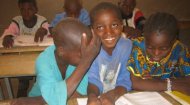|
Sponsor a Child | Sponsor a Child | Sponsor a Child | Sponsor a Child |

|
A critical component of the success of modern child sponsorship programs is the indispensable role of local partners. International non-governmental organisations (NGOs) work hand-in-hand with local community leaders, grassroots organisations, and government entities. These local partners are the lifeblood of the programs; they possess an intimate understanding of the cultural nuances, specific needs, and existing social structures of their communities. They are responsible for project implementation, monitoring progress, and ensuring that interventions are culturally sensitive and truly responsive to the community's priorities. This localised leadership ensures sustainability, empowering communities to take ownership of their development and reducing dependency on external aid. Without these dedicated local networks, the profound impact of choosing to sponsor a child in Africa would be significantly diminished. The measurable benefits stemming from these comprehensive programs are far-reaching and transformative. Education is often at the forefront, with sponsorship funds contributing to school fees, uniforms, textbooks, and the development of adequate learning facilities. Children gain access to quality education, which is a powerful tool for breaking the cycle of poverty. Healthcare is another crucial area, with programs providing vaccinations, regular health check-ups, access to essential medicines, and vital nutritional support, especially for young children. Water, Sanitation, and Hygiene (WASH) initiatives significantly reduce illness and improve overall community health. Beyond these immediate needs, sponsorship programs also foster long-term social change by empowering families with economic opportunities, offering vocational training for youth, and promoting gender equality. The ripple effect of choosing to sponsor a child in Africa extends far beyond the individual, creating healthier, better-educated, and more resilient communities. Despite the overwhelmingly positive impact, it is essential to address common concerns associated with child sponsorship, such as dependency, donor transparency, and cultural sensitivity. Modern programs are designed precisely to mitigate dependency by focusing on capacity building and fostering self-reliance within communities. Funds are invested in sustainable infrastructure and skill development, enabling communities to thrive independently in the long run. Transparency is paramount, with reputable organisations providing regular updates on financial expenditure, program outcomes, and the progress of the communities they serve. Donors receive information, often directly from the sponsored child, allowing them to witness the real-world impact of their decision to sponsor a child in Africa. Furthermore, cultural sensitivity is woven into the fabric of these programs through strong local leadership and community participation, ensuring that interventions are respectful of local customs and values. Looking ahead, technology, local leadership, and global collaboration are continuing to reshape the landscape of how we sponsor a child in Africa. Digital communication platforms enable more frequent and personal updates between sponsors and children, fostering a stronger connection. Technology also enhances data collection and analysis, allowing organisations to measure impact more accurately and adapt programs for greater effectiveness. The increasing emphasis on empowering local leaders and indigenous organisations means that development initiatives are increasingly driven by those who understand the context best. Coupled with global collaboration that brings together diverse expertise and resources, the future of child sponsorship promises even more innovative, impactful, and sustainable approaches to alleviating poverty and empowering children across Africa. In conclusion, the decision to sponsor a child in Africa today is an affirmation of belief in a brighter, more equitable future. It is a commitment not just to an individual child, but to a comprehensive, community-led strategy designed to build lasting change. By understanding the modern mechanisms of these programs, donors can be assured that their generosity is contributing to measurable benefits in education, health, and holistic community development, truly transforming lives and breaking cycles of poverty for generations to come. It represents a powerful, informed choice to invest in the potential and resilience of African communities. If you're thinking, "I sponsor a child, will it make a real difference?" Consider this. There was a doctor who helped others who were victims of the Bali bombing and, being one of the first on the scene, was able to save the lives of many. It turned out he had been a sponsored child, and, without the help of someone like yourself, would never have had the opportunity to train to be a doctor and save others. Makes you think, doesn't it? And remember, all those images on the television about starving children are stereotypical (though often true). Most African kids have a cracking sense of humour and have aspirations for a better life. Without you, that's probably beyond their reach. |
























































